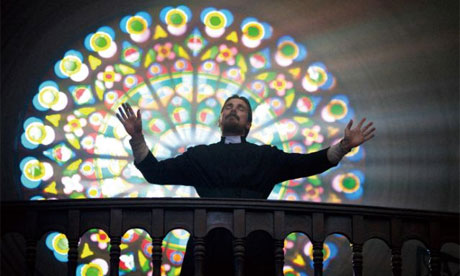
Heralded as a new dawn in China-Hollywood co-operation, this ambitious war film from Zhang Yimou is an attempt to turn the revolting aftermath of the 1937 Japanese assault on Nanjing into a globally friendly, putatively inspiring epic that also aims to underscore the US and China's geopolitical mutual respect.
Zhang has imported Christian Bale to play the lead, as an American mortician called John Miller who turns up in Nanjing as Japanese soldiers consolidate their grip on the hapless city, then the capital of Chiang Kai-shek's Chinese republic. He's there to look after the body of a dead priest, but the morally shaky Miller quickly finds himself in the priest's place – drinking his wine, wearing his clothes, and having to protect a gaggle of convent schoolgirls after marauding Japanese soldiers attempt a mass rape.
The church where all this takes place is also the temporary home for a group of highly schooled prostitutes; their leader Yu Mo (Ni Ni) swiftly becomes the object of desire for the lecherous Miller (and also the principal vehicle for the film's extended English-language dialogue, which is no doubt intended to increase its commercial chances in the west). Yu certainly looks the part, but her English is delivered in an ultra-controlled monotone, which unfortunately deprives her scenes with Bale of most of the chemistry they are clearly supposed to contain.
As for Bale himself, he is enthusiastic enough in his role, alternating loucheness with dewy-eyed emoting, though there's an unavoidable feeling he's in a different movie to the rest of the cast. Bale specialises in a sort of coiled-spring ferocity, which is never far away from the surface, and doesn't always sit comfortably with the more balletic, formalised performances of the Chinese and Japanese actors.
Be that as it may, Zhang pulls out lots of directorial stops: there are a number of bravura combat sequences (notably one in which a single Chinese soldier takes out an entire Japanese platoon), a gruesome scene outlining the (documented) nature of the Japanese sexual assaults on civilians, and tremendous handheld cinematography reflecting the girls' panic when the troops storm in. However, despite the energy and care with which each scene is set up, Zhang never quite manages to overcome the penned-in sense of the drama: despite occasional forays outside, most of the action remains churchbound. This wouldn't be a problem in itself – it just seems a little self-defeating in a war epic; the constant scurrying around and squabbling among the women characters doesn't help either, tending to distract from the larger picture.
Be that as it may, the Nanjing massacre is still a running sore in China's 20th century history, and Zhang is brave to take it on. It's fair to say that something has been sacrificed in translation, the ponderous romance he offers to appeal to an international audience doesn't really do the historical record full justice. But in terms of focusing the world's attention on China's cinematic muscle, he does admirably.

